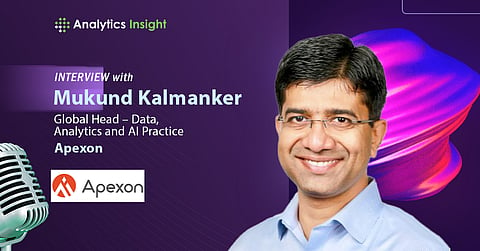

Artificial intelligence is driving business innovation over the past few years through prediction, classification, and optimization. Generative AI enhances this by enabling information synthesis, human-like interactions, and mass content creation. Now, after two and a half years since ChargeGPT launched, businesses are redesigning processes with Generative AI.
The next frontier is agentic AI, a shift from static models to dynamic, goal-oriented systems capable of independent decision-making. Unlike current AI, which relies on specific prompts, agentic AI functions like digital agents, continuously assessing inputs and learning in real-time with minimal human intervention.
In the latest podcast episode of the Analytics Insight Podcast, Priya Dialani speaks to Mukund Kalmanker, Global Head, Data, Analytics, and AI Practice at Apexon, to discuss how businesses can prepare for this shift.
Apexon is a pioneering AI-driven engineering firm, dedicated to addressing real-world business challenges through technology. Mukund Kalmanker describes the company's value as being rooted in a culture of questioning assumptions, innovating quickly, and infusing intelligence into every layer of engineering.
"We construct groups with our customers, we work intensely, and we make sure innovation is not a theory but an experience," he explained.
Apexon's services span regulated sectors such as healthcare, banking, and insurance, as well as retail, hospitality, and technology domains, utilizing AI-driven solutions. Its offerings center on three pillars: AI, data, and digital experience. With this converged strategy, Apexon can help clients become intelligent enterprises that are agile, adaptive, and driven by insights.
Mukund spearheads Apexon's AI, analytics, and data business with a twofold mandate, expanding the group's global presence while cultivating an AI-first innovation culture. He terms his role as being both strategic and cultural.
"It's about making Apexon an AI-driven organization. Each service we provide should be infused with AI, generating measurable business value for our clients," he added.
With over a decade of experience in AI and three decades of technology experience, the head of the Global Data, Analytics, and AI Practice at Apexon has witnessed firsthand how data has evolved from an operational byproduct to the very foundation of enterprise insight. Under his guidance, Apexon has become a recognized emerging player in AI-enabled transformation, as cited by industry leaders such as Gartner and ISG.
Whereas GenAI democratized AI throughout organizations, agentic AI adds a new level of complexity and potential. Enterprises want to shift from testing to production deployment, but there are essential questions to be answered:
Trust: Are autonomous agents trustworthy in production environments?
Scalability: Are enterprise systems ready to handle the complexity and uncertainty of agents?
Governance: What infrastructure, ethics, and compliance guardrails must be established to ensure safety and accountability?
Mukund pointed out that responding to these questions requires not only technological preparedness but also cultural and organizational fit. Businesses need to have an experimental mindset but develop strong risk management frameworks.
Mukund believes the future of AI in the enterprise lies at the intersection of innovation and trust. Apexon’s vision is to embed agentic and generative AI into client ecosystems in a way that balances creativity with governance.
The company’s progress is evident in its partnerships with major banks, healthcare providers, retailers, and global tech players, organizations that rely on Apexon to design, test, and scale next-generation AI solutions.
“Where innovation starts, our ingenuity leads,” Mukund Kalmanker summarized. “Our goal is not just to build technology, but to help enterprises transform into truly intelligent organizations.”
As agentic AI moves from buzzword to boardroom, the enterprises that succeed will be those that combine innovation with responsibility. Apexon, under Mukund Kalmanker’s leadership, is charting a path where data, AI, and engineering converge to solve business challenges and unlock new opportunities.
For enterprises, the time to act is now. The shift from static AI models to autonomous, adaptive agents could well define the next decade of business transformation.
